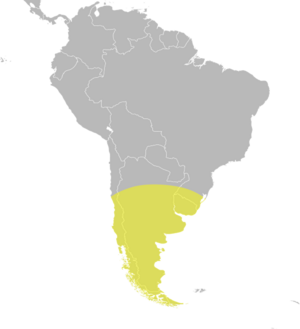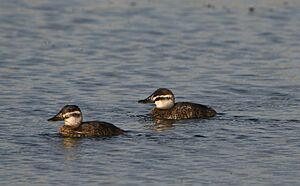Lake duck facts for kids
Quick facts for kids Lake duck |
|
|---|---|
 |
|
| Conservation status | |
| Scientific classification | |
| Genus: |
Oxyura
|
| Species: |
vittata
|
 |
|
| Oxyura vittata range | |
| Synonyms | |
|
Erismatura vittata (Philippi, 1860) |
|
The lake duck (Oxyura vittata) is a small, South American stiff-tailed duck. It is also called the Argentine blue-bill, Argentine blue-billed duck, Argentine lake duck, or Argentine ruddy duck.
Description
The lake duck grows to 36–46 centimetres (14–18 in). Females weigh 510–700 grams (18–25 oz) and males 600–850 grams (21–30 oz). Males can be distinguished from Andean duck (Oxyura ferruginea), a similar species, by being smaller and having a flatter head.
Behavior
Little is known about the lake duck's diet, but it is believed to consist of small invertebrates, seeds, and plant remains. The breeding season varies between countries, occurring from October to January in Argentina. Males produce popping noises and "mechanical rustling noises" for display.
Distribution
The lake duck is a partially migratory species. It lives in bodies of freshwater with large amounts of vegetation, such as wetlands and lakes. It is very widespread, naturally occurring in Argentina, Brazil, Chile, Paraguay, and Uruguay, and having been introduced to the Falkland Islands. It has a stable population of 6,700–67,000, with no major threats. As of 2016, it is listed as a species of least concern on the IUCN Red List.



